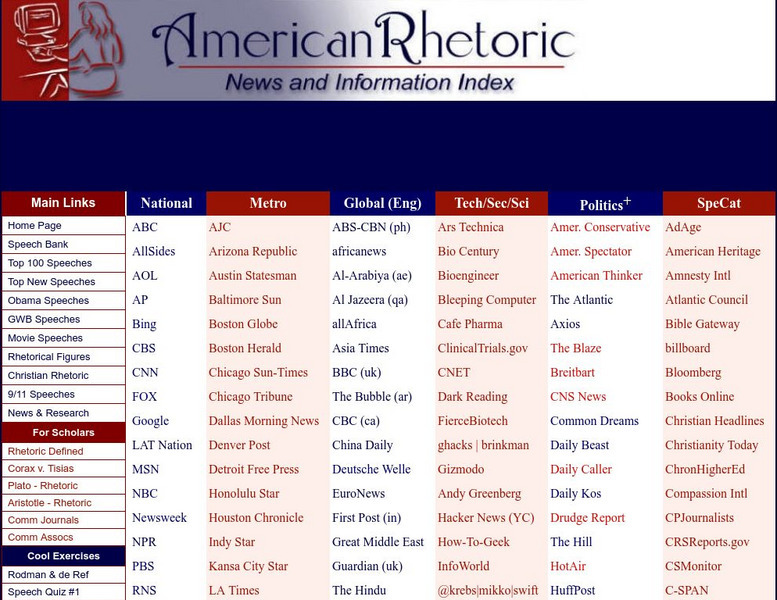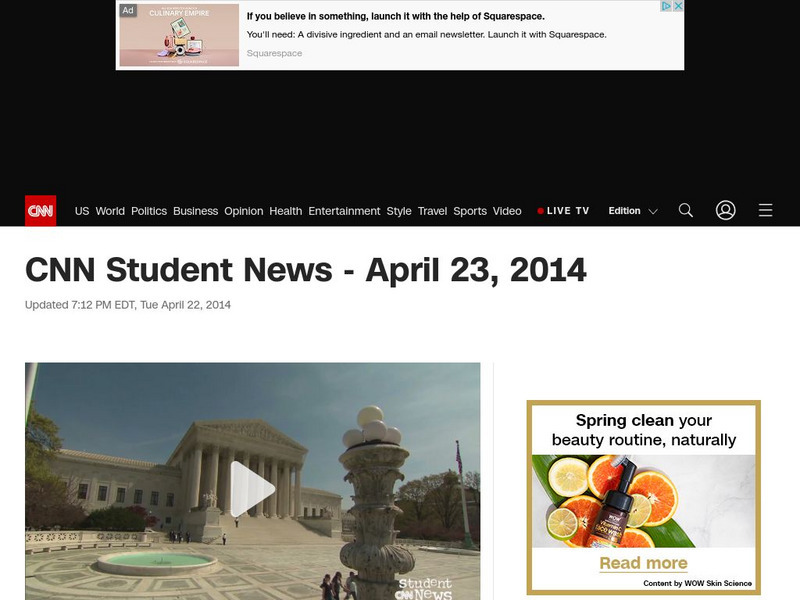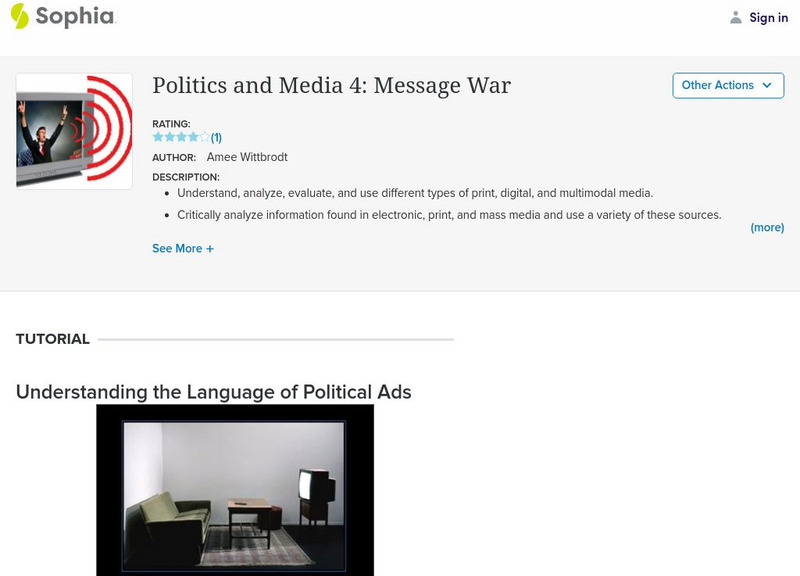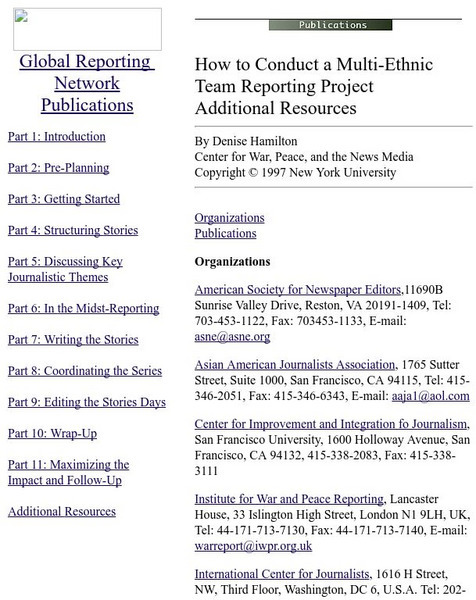Hi, what do you want to do?
Georgia Department of Education
Ga Virtual Learning:"distinguishing Fact, Opinon, & Reasoned Judgement" [Pdf]
This is a PDF entitled "Distinguishing between Matters of Fact, Matters of Opinion, and Matters of Reasoned Judgement," which focuses on how to separate fact from opinion, provides examples, and offers a practice activity.
American Rhetoric
American Rhetoric: News and Information Index
This website is a news and information index that offers links to news sources, newspapers, magazines and journals, search engines, polling data, legal resources, and citation guides.
Annenberg Foundation
Annenberg Learner: News Writing: Interviews
A variety of news writing interviews from professionals in the field. Some examples of the professionals include Andy Rooney, Kurt Loder, and Joyce Davis.
Other
Monash University Library: Evaluating Web Pages
Use this guide to learn how to evaluate web pages. This concise guide also addresses why evaluation is important. CCSS.ELA-Literacy.CCRA.R.7
Virtual Salt
Virtual Salt: Introduction to Critical Thinking
An introduction to the concept of Critical Thinking examines the true definition and gives examples where it can be used as a constructive force.
Other
The American Journalism Review
This is an excellent newsletter-style site for the American Journalism Review. Aside from a ton of articles and pertinent information, it offers essential resources, first rate tools, and a huge database for journalists.
Sophia Learning
Sophia: Research Sources: Websites
This slideshow lesson focuses on the use of websites for research sources. It gives the pros and cons to using websites as sources and discusses the need to evaluate websites and what to look for.
New York Times
New York Times: Evaluating Sources in a 'Post Truth' World: Fake News
[Free Registration/Login Required] Need help determining fake news from real news? This seems to be a problem today. Find practical activities and questions to help navigate a media landscape in which it is increasingly difficult to tell...
CNN
Cnn: Student News April 23, 2014
News program reports on the current events of the day. Includes a video, transcript and critical analysis questions.
Other
Media Education Lab: Assignment: Media Literacy: Secondary School
A well-done set of units that helps teachers teach the importance of media literacy to their students. Click on Secondary School Introduction to see a video of teachers in the classroom instructing students in ways of using and...
Sophia Learning
Sophia: Evaluating Digital Information: Tutorial
In this slideshow tutorial, students will review how to evaluate digital sources. During the digital evaluation process, students are directed to analyze the following: authority, accuracy, objectivity, and currency. After the tutorial,...
Sophia Learning
Sophia: Politics and Media 4: Message War
Through a variety of resources and external links, students gain an understanding of the language of political ads.
Sophia Learning
Sophia: Research Sources
This slideshow lesson focuses on research sources by listing 10 types of sources: books, periodicals/magazines, newspaper articles, scholarly articles, databases, reviews, interviews, lectures, media (film, television), and websites. It...
Sophia Learning
Sophia: Research Sources: Periodicals
This slideshow lesson focuses on the use of periodicals as research sources; it discusses the pros of using periodicals as organizational aids and in research of current events and also the cons of periodical's lack of depth and possible...
Other
The Critical Thinking Community: Tactical and Structural Recommendations
16 brilliant suggestions for creating critical thought in the classroom.
Boston University
How to Conduct a Multi Ethnic Team Reporting Project
This site offers a phenomenal plan for assembling a culturally diverse journalism team to work on a story (or series of stories) of social significance. This extensive guideline provides step by step instructions. (Note: some links may...
Sophia Learning
Sophia: 5 Core Concepts of Media Literacy
In this lesson, students will engage in multiple parts of a lesson that guide students to uncover many levels of meaning in media messages. Discussion questions and a slideshow presentation are parts of the lesson that address the...
International Reading Association
Reading Online: Classroom Strategies for Exploring Authenticity in the Media
Four innovative classroom activities that actively engage students in analyzing and criticizing media messages. SL.11-12.2 Eval&Integrate sources
Virtual Salt
Virtual Salt: Evaluating Internet Research Resources
This site by Virtual Salt offers a great deal of information on evaluating internet sources. Gives tips on what to look for when screening information for usefulness and reliability.
Annenberg Foundation
Annenberg Learner: Interactives: Historical and Cultural Contexts
This interesting interactive website explains kinds of primary sources and gives you the chance to identify them in some games.
University of North Carolina
University of North Carolina: Writing Center: Handouts: Evidence
What kinds of evidence best support the points you make in a paper? Where can you find the evidence you need? This handout answers all these questions and more, including the difference between primary and secondary sources. You'll also...
Other
Babson College: Evaluating Quality on the Net
Internet research is a fine writing tool, but can you trust the information you find? This presentation by Hope N. Tillman, Director of Libraries at Babson College, gives advice on assessing the quality and credibility of information...
University of California
Uc Berkeley Library: Critical Evaluation of Resources
Questions to ask yourself when determining if a source is reliable. Discusses difference between primary and secondary source. List of reference sources and links to other sites that teach you how to evaluate sources....
American Rhetoric
American Rhetoric: Communication Journals
This is an index of communication journals and their publishers with links to the journals.





![Ga Virtual Learning:"distinguishing Fact, Opinon, & Reasoned Judgement" [Pdf] Unit Plan Ga Virtual Learning:"distinguishing Fact, Opinon, & Reasoned Judgement" [Pdf] Unit Plan](https://static.lp.lexp.cloud/images/attachment_defaults/resource/large/FPO-knovation.png)

















